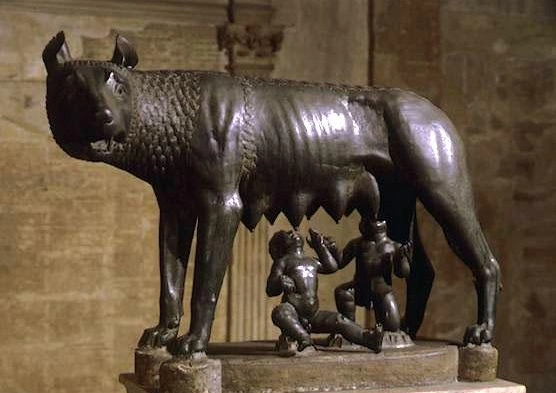Numa Pompillius Roman The legendary second king of Rome, who succeeded Romulus to the throne; eventually seen as an agricultural deity.
Publié le 26/01/2014
Extrait du document

Numa Pompillius Roman The legendary second king of Rome, who succeeded Romulus to the throne; eventually seen as an agricultural deity. Upon the death of Romulus, the legendary founder of the city of Rome, the citizens and senate of the city invited Numa to be their king. At that time, Numa, who was about 40 years old, was living a life of seclusion in a Sabine town, mourning the death of his wife. He had established himself as a man of peace, fairness, and justice. After the warlike beginning of their city under the powerful and military influence of Romulus, and a year of oppression under the alternating rule of the senators, the people sought a leader to establish order and justice. Numa, legend tells, had the traits they needed. In addition, his birth as a Sabine would help unite the different peoples living in the expanding city at that time. Numa's first objective was to establish order in Rome. He divided conquered lands equitably among people and established boundaries. He introduced the people to the god Terminus, who helped them learn to respect borders and property lines. Then Numa turned his attention to establishing religious rites. In this work Numa received magical help from the Nymph Egeria, with whom he had a close relationship. Egeria was his teacher and mentor. She provided Numa with the ceremonies he would need to give to his people and taught him how to properly worship the gods and goddesses. Numa also had magical powers. He could summon gods, contain them at his feasts and festivals and coerce them into helping him. At one feast, he mixed wine with water and used it to summon and trap Faunus and Picus, two rural gods, who then taught him how to summon the great god Jupiter. Once Numa had Jupiter in his grasp, the king persuaded the god to stop requiring human sacrifices.
Liens utiles
- Roma Roman A legendary figure who came to be worshiped as a goddess, Roma was the personification of the city of Rome.
- Seven Against Thebes Greek The name given to the conflict between the rulers of the kingdom of Thebes and the rebels who challenged the king for the throne.
- Juno (Iuno) Roman An old goddess among the Roman people who became one of the principal deities of ancient Rome.
- Latinus Roman A legendary, perhaps historical, king of the Latini or Latins, an original people of central Italy, and the hero from whom that people got their name.
- Mephitis (Mefitis) Roman A goddess who protected the people of Rome and surrounding cities in Italy from the dangerous fumes of sulphur that spewed from the many volcanoes and the gaseous vents surrounding them.































